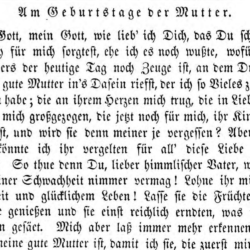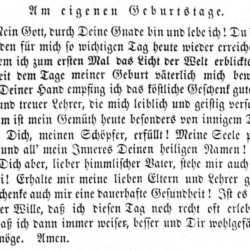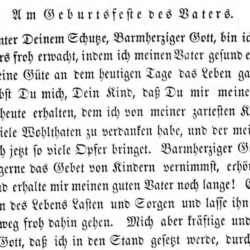TOGGLE COLUMNS (on/off):ADJUST COLUMN POSITIONS: select the column header cell and drag it where you want. show me!COPY INDIVIDUAL COLUMN(S): use CopyTables, a browser extension.
| Source (German) | Translation (English) |
|---|---|
Am Geburtstage des Lehrers. |
On one’s Teacher’s birthday. |
“Diesen Tag gab uns der Herr, lasset uns ihn feiern mit Wonnegesang!” Diese Worte des Psalmisten erklingen heute besonders freudig in unsern Herzen, indem wir den Tag feiern, an welchem Du, Allgütiger, einst einen unserer größten Wohlthäter in’s Dasein gerufen und uns einen treuen Lehrer schenktest, der mit so vieler Liebe, Mühe und Geduld sich unserer annimmt, unsern Geist bildet, unser Herz veredelt und uns mit so vieler Liebe die Tugendbahn leitet. |
“This day the Lord gave us, let us celebrate it with joyful song!” (Psalms 118:24) These words of the psalmist resound especially joyfully in our hearts today, as we celebrate the day on which You, All-Good One, once called one of our greatest benefactors into existence and gave us a faithful teacher, who takes care of us with so much love, effort and patience, forms our minds, ennobles our hearts and guides us along the path of virtue with so much love. |
Darum heben wir nun unsere Herzen zu Dir, dem Geber aller guten Gaben, empor, um Dir für das große Geschenk dieses Tages zu danken und Dich zu bitten, daß Du unsern Jugend⸗Bildner diesen Tag noch recht oft gesund und froh erleben lassen mögest, damit er noch lange segensvoll unter uns wirke und noch viel andere Kinder Dir, dem Vater unseres Lebens, zuführe. |
Therefore, we lift up our hearts to You, the Giver of all good gifts, to thank You for the great gift of this day and to ask You to let our youth educator experience this day often in health and joy, so that he may continue to work beneficially among us for a long time and bring many other children to You, the Father of our lives. |
Gib, o guter Gott, daß wir nicht durch Trägheit, Leichtsinn, oder Muthwillen ihm das Amt erschweren und sein Leben verkürzen; sondern stehe Du ihm und uns bei, daß es ihm leicht werde, uns zu erziehen und zu unterrichten, auf daß wir immer mehr zunehmen an Kenntnissen und guten Eigenschaften. Amen. |
Grant, O good God, that we may not through laziness, carelessness, or willfulness make his duties more difficult and shorten his life; but assist him and us that it may become easy for him to educate and instruct us, so that we may increase more and more in knowledge and good qualities. Amen. |
“[Gebete] Am Geburtstage des Lehrers” was written by Rabbi Benjamin Szold and included in his הגיון לב Israelitisches Gebetbuch für die häusliche Andacht (1867), pp. 252-253.
We welcome corrections and improvements. The transcription of the German from Latin script in Fraktur type provided machine-readable text for a machine translation by DeepL, which we then edited for accuracy and clarity. –Aharon Varady
Source(s)


“Am Geburtstage des Lehrers | On one’s Teacher’s Birthday, by Rabbi Benjamin Szold (1867)” is shared through the Open Siddur Project with a Creative Commons Attribution-ShareAlike 4.0 International copyleft license.










Comments, Corrections, and Queries